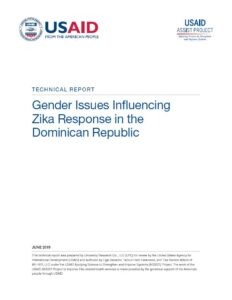Gender Issues Influencing Zika Response in the Dominican Republic

Zika Response in the
Dominican Republic
To examine gender integration in the Zika response in the Dominican Republic, ASSIST partner WI-HER, LLC conducted a rapid gender assessment in April 2018. In the Dominican Republic, while there is a study of the impact of the Zika virus on women, girls, boys, men and adolescents of both sexes, there is no existing analysis of how gender issues affect the ASSIST Zika quality improvement project. Therefore, this report aims to fill an important gap. This document offers an overview of these issues and how to identify and address critical gender concerns with contextually appropriate interventions. This document includes the WI-HER methodology developed under ASSIST, a desk review, and a commented analysis of data collected through qualitative gender assessment.
The gender assessment drew on focus group discussions in three sites in the three provinces with the highest number of Congenital Syndrome associated with Zika (CSaZ) cases and where ASSIST was implementing quality improvement activities. Focus group discussion participants were adult males, women of reproductive age, and grandparents. In total, there were 81 participants; 33 (41%) were men, and 48 (59%) were women. These sites—in Cienfuegos, Santo Domingo, and Barahona—provided different perspectives from urban, peri-urban, and rural populations. Data collection team members were experienced in qualitative methods, fluent in Spanish, and familiar with Zika. The team used a structured focus group and interview discussion guide, probing for general knowledge about Zika before asking questions about sexual transmission of Zika, condom use, and caring for children with CSaZ. To identify actors that could support families with children with CSaZ, each group participated in a brainstorming and prioritization activity.
The gender assessment revealed issues that affect the quality and effectiveness of antenatal care, postnatal care, and family planning. Some of these issues included: limited decision-making power of women and girls over their sexual and reproductive health; resistance to condom use by couples in long-term relationships, including during pregnancy; low participation of males in antenatal care counseling; and biased attitudes of sexual and reproductive health service providers.
These critical issues need to be addressed as part of quality improvement of the Zika response at health facilities and through community-based activities to reach populations with limited access to health facilities.
This report provides evidence of the wide-ranging impact of Zika on the lives of girls and women and boys and men in the Dominican Republic and the role that gender plays in its perpetuation. Measures to address these challenges must be implemented at the community, health facility, institutional, and cultural levels to create lasting, positive change.